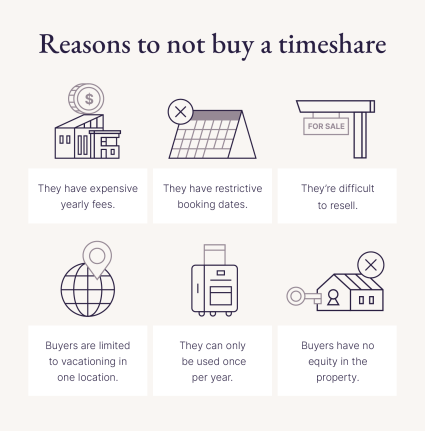Menu

| Alternative | Flexibility | Ownership | Ongoing Fees | Typical Cost |
|---|---|---|---|---|
| Second home co-ownership | Medium | Yes | Yes | Fractional purchase |
| Vacation rentals | High | No | No | Nightly/weekly rate |
| Hotels | High | No | No | Nightly rate |
| Resorts | High | No | No | Nightly rate |
| Travel clubs | Low | No | Membership | Annual membership |
| Vacation home ownership | High | Yes | Yes | Ownership of property |
| Vacation clubs | Low | No | Membership | Annual membership |
| Fractional ownership | Medium | Yes | Yes | Share of property |
1. Second home co-ownership
Second home co-ownership is when a property is jointly owned by multiple people. Buying a vacation home is a greater upfront expense than a timeshare, but you don’t have to be the sole owner. Co-ownership is a viable way to make that dream of a second home a reality. With this timeshare and vacation home alternative, you’ll only be responsible for a fraction of the purchase price and yearly ownership costs. Whether you’re buying with a group of friends or buying a Pacaso second home, you still have true real estate property ownership. You’re not just buying the right to use a hotel or condo-sized space for a set period.Timeshares are notoriously difficult to sell due to the many rules and limitations owners must abide by. The timeshare is also one of many identical units, creating an imbalance between supply and demand. On the other hand, unique homes attract buyers who must compete against each other in the whole housing market. Browse a plethora of luxury co-ownership options all over the world with Pacaso’s portfolio.2. Vacation rentals
Vacation rentals are furnished spaces that are rented out on a short-term basis. Airbnb and Vrbo are nothing new — 45% of travelers compare short-term rental options and hotels when looking for a place to stay. Airbnb is as popular as ever, with 265 million users and over 7.7 million listings, according to Lighthouse. People choose vacation rentals because renting a property from a private owner is often cheaper than comparable hotel rooms, and they often give travelers added perks like kitchens and convenient locations. However, vacation rentals can come with charges like cleaning fees, sometimes making them even more expensive than hotels. Vacation rentals are considered preferable alternatives to timeshares because they give greater flexibility in where and when you can vacation. You’re only paying for specific days, so you aren’t on the hook for yearly fees on top of the purchase price of a timeshare. Timeshare owners often sell their timeshare days when they can’t use them, giving vacationers the option to visit the same timeshare facility without the long-term commitment.3. Hotels
Hotels are consistent and safe timeshare alternatives that are accessible all over the world. When you book a room at a hotel chain in Chicago, for example, you’ll get a comparable experience to the same chain in Los Angeles, taking out the guesswork in finding quality accommodations. Hotels are reliable but don’t offer the permanence and privacy of a timeshare or second home co-ownership model. Although the cost may be higher on a night-by-night basis than a timeshare, when you factor in yearly timeshare maintenance fees, you’ll usually come out ahead. Hotels are best for short-term stays, not memberships like timeshares.Hotels often provide discounts to certain groups (like the military and AAA) or offer discounted rates throughout the year, making them even more affordable. Some hotel chains offer rewards programs, so the more you stay there, the more you get back.4. Hostels
A hostel is a budget-friendly alternative to hotels with dormitory-style rooms and communal areas. They’re ideal for backpackers and young travelers seeking a social vacation where they might meet people from all walks of life. Hostels are typically sparse in accommodations compared to timeshares, but the trade-off is worth it for people who enjoy different locations every year. You can find various types of hostels on apps and sites like Booking.com. In a budget hostel, you may stay in a room with six or more people. A boutique or luxury hostel may offer more upscale vibes and cleaner amenities, while party hostels host social activities and late active hours.5. Resorts
Resorts offer an all-inclusive appeal of many of the best timeshares, such as private beach access, live entertainment, gourmet food and guided tours. You’ll spend less time planning all the details of your vacation, leading to less stress and more time enjoying your break. Just like hotels, resorts give you the flexibility to stay for longer or shorter durations than a timeshare. You won’t be boxed into traveling at predetermined times of year, and you can visit whenever you want.One example of a famous luxury resort is the Four Seasons Resort Hualalai in Hawaii, which boasts many amenities like spas, pools, beach access, multiple restaurants and exceptional customer service.6. Travel clubs
Travel clubs offer group travel rates to various destinations. Travel clubs operate similarly to timeshares and vacation clubs, while being slightly more affordable. Travel clubs require yearly membership fees, and some clubs also charge maintenance fees. These combined costs are often lower than those of vacation clubs.The benefit of travel clubs is that they arrange for group rates, making your stay cheaper while giving you the benefit of travel companions. Oftentimes, the club is centered around a shared trait, like a hobby or age group. Aside from the social aspect of travel groups, travel clubs also free you from long-term commitments. Even the cost of an inexpensive timeshare begins to add up over the years if you aren’t able to sell it. Since membership in a travel club is yearly, you’ll only lose what you’ve already spent.7. Vacation home ownership
One big draw of owning a timeshare is the dependability of returning to the same destination year after year while avoiding the rising costs of accommodations. Buying a second home in a vacation destination gives you those same benefits and more. Unlike a timeshare, buying a vacation home gives you real equity in the property, so you have the potential to recoup the money you put into it over the years. Timeshares rarely appreciate in value, and due to the many drawbacks of timeshare ownership, they can be extremely difficult to resell.When you have your own vacation home, you have the freedom to use it as much as you want. In contrast, most timeshare options only allow you to use them once per year and have fixed scheduling limitations.8. Vacation clubs
Vacation clubs are travel services that offer members access to different vacation locations and amenities within their network of affiliated properties. Vacation clubs are the closest alternative to timeshares. To join, you’ll pay an initial sign-up fee, plus yearly membership and maintenance fees for as long as you’re a member. In return for your membership, you’ll receive discounts to the destinations in the club’s network.For example, a Holiday Inn Club membership works by purchasing credits. However, many clubs have blackout dates that restrict your ability to travel unless you pay more money. Depending on the club you join, it could cost more per year than even luxury timeshares, but you’ll have easier access to multiple destinations.9. Fractional ownership
Fractional ownership is a collaborative investment where multiple parties share ownership of a vacation property. Each investor maintains specific ownership rights and entitlements to the asset based on their contribution. Fractional ownership is similar to vacation home co-ownership in that you can schedule specific usage times and/or access to different parts of the property. Splitting the costs of a vacation home comes with benefits like owning a home in a luxury location that you might not otherwise be able to afford. You also share upkeep and maintenance costs. However, it also means all major decisions must go through all ownership partners. You’re also splitting benefits, leading to potential disagreements between owners.
How to resell your timeshare?
As you browse timeshare exit vacation alternatives, you may wonder how to best get out of a timeshare. Though it can be difficult, there are a few ways to resell your timeshare. Here are some options:- Reselling the contract during cool-off periods: There might be a cool-off period in which you can resell or cancel your timeshare without a penalty.
- Selling them on the resale market: Going through a broker or resale site, you may be able to sell your timeshare.
- Reviewing contract for deed-back programs: If there’s a deed-back program in your timeshare contract, you may be able to return the timeshare under specific conditions.
- Negotiation with the timeshare provider: You might be able to make a deal with the timeshare provider directly.
Consider second home co-ownership
These timeshare alternatives may help you avoid a major scam and stick to your original goal of enjoying a beautiful vacation with your loved ones. Unlike a timeshare, Pacaso’s LLC co-ownership gives you true co-ownership of a property with access to your home all year round. Browse our portfolio of elite vacation homes to get started.Timeshare alternatives FAQ
01: Can you write off a timeshare on taxes?
Since a timeshare is not the same as owning real estate, not all of the same tax deductions apply.
Things that can be deducted include:
- Property taxes so long as they are separate from your maintenance fees
- Expenses related to the rental of the timeshare
Things that cannot be deducted include:
- Closing costs and legal fees
- Maintenance fees if the property was not being rented
If you’re looking for a tax deductible investment, you’ll likely be better off looking at timeshare alternatives involving true ownership of the property. And it’s smart to consult with a tax professional before making a purchase.
02: Can you inherit timeshare debt?
Yes. Family timeshares will be included in the probate process when the owner of the timeshare dies. The executor will be responsible for paying the maintenance fees from the owner’s estate until the timeshare has been properly distributed. If the owner’s heir accepts the timeshare, they will be responsible for any remaining debts and fees.
03: Can a timeshare be exchanged for another vacation option?
Your timeshare vacation options are limited by the details of your contract. Some timeshare companies have networks that allow you to spend your week or points at other locations. These often come with stipulations regarding when you can use them and who has first rights to select dates, and they may come at an extra cost.
04: What are the financial benefits of second home co-ownership over timeshares?
With second home co-ownership, you own the property, not time. Because it’s a real estate asset, its value will move with the market. However, with a timeshare, you own the right to use the property for a period instead of the property itself. It’s not a real estate asset, and its value depreciates over time. Second home co-ownership with Pacaso comes with a streamlined reselling process and high demand for shares.










